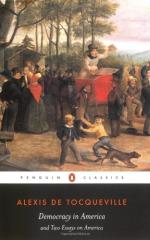
|
| Name: _________________________ | Period: ___________________ |
This test consists of 15 multiple choice questions and 5 short answer questions.
Multiple Choice Questions
1. According to de Tocqueville, in America men obey what?
(a) Justice and laws.
(b) God.
(c) Divine authority.
(d) Secular authority.
2. To an American writer, the individuals and events are related how?
(a) They are independent of each other.
(b) They are interrelated, although not dependent on each other.
(c) They rely on each other.
(d) They are dependent on each other.
3. Of what does de Tocqueville state that the United States does not produce a valuable body?
(a) Philosophy.
(b) Literature.
(c) Knowledge.
(d) Science.
4. Materialism and _______ are part of the consequences of a perceived equality of conditions.
(a) Intellectualism.
(b) Egoism.
(c) Perseverance.
(d) Mediocrity.
5. In what does de Tocqueville say American writers find poetry?
(a) Intellect.
(b) The mundane.
(c) The nation.
(d) Passion.
6. What deals with the affairs of the people and is bound to be turbulent and uncertain?
(a) Politics.
(b) Religion.
(c) Community.
(d) Society.
7. What year was de Tocqueville's voyage to the United States?
(a) 1830.
(b) 1850.
(c) 1820.
(d) 1840.
8. The balancing act that the three branches of government perform on each other is referred to as what?
(a) Checks and balances.
(b) Opposing powers.
(c) Freedom from tyranny.
(d) Federalism.
9. Religion and the constant drive for ___________ are the main barriers to the development of independent arts and science in the United States, according to de Tocqueville.
(a) Material wealth.
(b) Cupidity.
(c) Economic progress.
(d) Comfort
10. In a monarchic regime, political positions and the bulk of the wealth are reserved for whom?
(a) The members of the monarchy.
(b) The members of the monarchy and their friends.
(c) The members of the aristocratic minority.
(d) The members of the aristocratic majority.
11. Compared to the European system, de Tocqueville says the America court system is what?
(a) Mild.
(b) Meek.
(c) Powerless.
(d) Small.
12. When can a judge refuse to enforce a law?
(a) When they do not agree with the law.
(b) When the people they are representing do not like the law.
(c) When they do not like the law.
(d) When the law in unconstitutional.
13. De Tocqueville compares equality to what weapon?
(a) A spear.
(b) A bow and arrow.
(c) A double-edged sword.
(d) A dagger.
14. The people in a democracy instinctively acknowledge that the interest of the many is more valuable than that of whom?
(a) The wealthy.
(b) The monarchy.
(c) A small but active minority.
(d) A privileged few.
15. What kind of literature does America produce?
(a) Reports.
(b) Romantic.
(c) Novels.
(d) Journalistic.
Short Answer Questions
1. When American writers exaggerate the importance of a subject, de Tocqueville says it gets lost in what?
2. What is an essential tool for maintaining liberty?
3. In de Tocqueville's observations, the patriotism of Americans is more akin to cupidity than to what?
4. Lawyers are connected to the aristocracy by their personal interest and what?
5. What kind of impact does the American press have on its people?
|
This section contains 469 words (approx. 2 pages at 300 words per page) |

|




